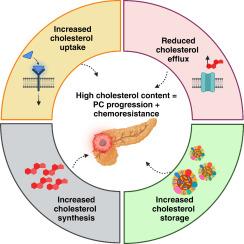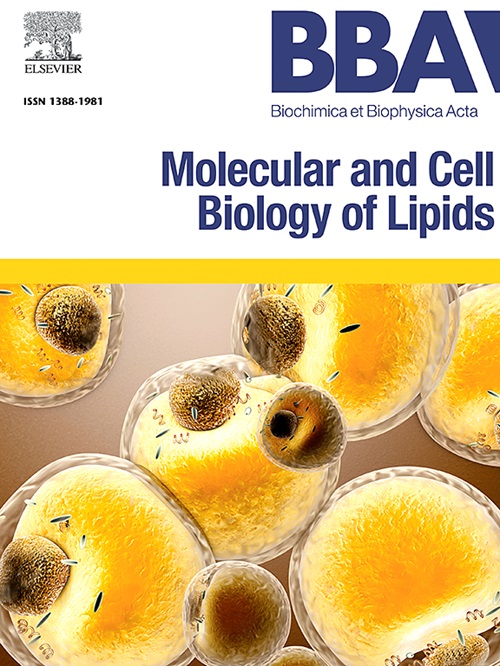Cholesterol metabolism in pancreatic cancer and associated therapeutic strategies
IF 3.9
2区 生物学
Q2 BIOCHEMISTRY & MOLECULAR BIOLOGY
Biochimica et biophysica acta. Molecular and cell biology of lipids
Pub Date : 2024-11-13
DOI:10.1016/j.bbalip.2024.159578
引用次数: 0
Abstract
Pancreatic cancer remains one of the most lethal cancers due to late diagnosis and high chemoresistance. Despite recent progression in the development of chemotherapies, immunotherapies, and potential nanoparticles-based approaches, the success rate of therapeutic response is limited which is further compounded by cancer drug resistance. Understanding of emerging biological and molecular pathways causative of pancreatic cancer's aggressive and chemoresistance is vital to improve the effectiveness of existing therapeutics and to develop new therapies. One such under-investigated and relatively less explored area of research is documenting the effect that lipids, specifically cholesterol, and its metabolism, impose on pancreatic cancer. Dysregulated cholesterol metabolism has a profound role in supporting cellular proliferation, survival, and promoting chemoresistance and this has been well established in various other cancers. Thus, we aimed to provide an in-depth review focusing on the significance of cholesterol metabolism in pancreatic cancer and relevant genes at play, molecular processes contributing to cellular cholesterol homeostasis, and current research efforts to develop new cholesterol-targeting therapeutics. We highlight the caveats, weigh in different experimental therapeutic strategies, and provide possible suggestions for future research highlighting cholesterol's importance as a therapeutic target against pancreatic cancer resistance and cancer progression.

胰腺癌中的胆固醇代谢及相关治疗策略。
胰腺癌由于诊断晚、化疗耐药性强,仍然是致死率最高的癌症之一。尽管化疗、免疫疗法和基于纳米粒子的潜在方法的开发取得了最新进展,但治疗反应的成功率仍然有限,而癌症耐药性则进一步加剧了这一问题。了解导致胰腺癌侵袭性和化疗耐药性的新生物和分子途径,对于提高现有疗法的有效性和开发新的疗法至关重要。记录脂质(特别是胆固醇)及其新陈代谢对胰腺癌的影响,就是这样一个研究不足、探索相对较少的领域。胆固醇代谢失调在支持细胞增殖、存活和促进化疗抗药性方面具有深远的作用,这一点在其他各种癌症中已得到充分证实。因此,我们旨在深入综述胆固醇代谢在胰腺癌中的重要作用、起作用的相关基因、促进细胞胆固醇平衡的分子过程以及目前开发胆固醇靶向新疗法的研究工作。我们强调了注意事项,权衡了不同的实验性治疗策略,并为未来的研究提供了可能的建议,突出了胆固醇作为抗胰腺癌和癌症进展的治疗靶点的重要性。
本文章由计算机程序翻译,如有差异,请以英文原文为准。
求助全文
约1分钟内获得全文
求助全文
来源期刊
CiteScore
11.00
自引率
2.10%
发文量
109
审稿时长
53 days
期刊介绍:
BBA Molecular and Cell Biology of Lipids publishes papers on original research dealing with novel aspects of molecular genetics related to the lipidome, the biosynthesis of lipids, the role of lipids in cells and whole organisms, the regulation of lipid metabolism and function, and lipidomics in all organisms. Manuscripts should significantly advance the understanding of the molecular mechanisms underlying biological processes in which lipids are involved. Papers detailing novel methodology must report significant biochemical, molecular, or functional insight in the area of lipids.

 求助内容:
求助内容: 应助结果提醒方式:
应助结果提醒方式:


